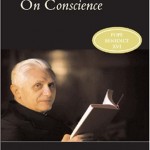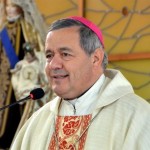This whole piece by John L. Allen is fascinating, but scroll down to the question:
Did Benedict resign?
Yet another point of interest from the recent press conference came when Francis took a question about papal resignation. He didn’t reveal his own plans, saying only that he’ll do “what the Lord tells me,” but did insist that he believes Benedict XVI historic decision to step down is not an “isolated case.”
In that connection, an essay on Tuesday by longtime Vatican watcher Vittorio Messori is intriguing. […]
The way Violi and Messori’s analysis goes, being pope has two basic components: agendo et loquendo — acting and teaching; and orando et patendo — praying and suffering. They believe Benedict laid down the former but never the latter, which explains his continuing residence in the Vatican and his continuing use of papal vestments. In effect, they believe he is continuing in some ways to function as pope, while leaving the work of governance to his successor.
As Violi puts it, Benedict “did not renounce the office, which is irrevocable, but only its concrete execution,” and even then only in part.
Messori argues that Francis may see things the same way, which perhaps helps explain why he prefers the title “Bishop of Rome,” of which he is unquestionably the only one at the moment, to “pope” or “pontiff,” of which there would now be two.
Messori gives all this a happy spin, writing that “it’s a gift [for the Church] that there is, physically shoulder to shoulder, one who leads and teaches and one who prays and suffers, for all, but above all to support his brother in the daily papal office.”
Time will tell if Francis himself will provide the next chance to see how a pontiff who steps down understands his act, and if he does, whether he’ll take the same approach as Benedict or blaze yet another a new trail.
In a way I cannot explain, reading this filled me with joy. I’m sure it is filling others with horror and fear. They run to Revelation all-too-willing to consider verses about imposters and anti-Christs than to consider verses about two witnesses. Or anything else.
In reading Messori’s essay (in my very lame Italian) I like this, part very much. It begins:
Il papa ha inteso rinunciare solo al ministerium , cioè all’esercizio , all’amministrazione concreta di quell’ufficio. Nella formula impiegata da Benedetto, si distingue innanzitutto tra il munus , l’ufficio papale, e la executio, cioè l’esercizio attivodell’ ufficio stesso. Ma l’ executio è duplice…
I get it as:
The pope intended only to give up Ministerium, that is the practical everyday (administrative) work of that office. The formula by Benedict…there is distinguishing a double (or two-fold) way…But also there is a spiritual aspect, of equal importance, which is enacted via suffering and prayer. Benedict said: “I do not return to private life…I do not wear more leadership in the Church, but for the Church’s good and with prayer I rest in the enclosure of St. Peter” but “enclosure” should not be comprehended only as a material place to live but is also a “place” theological.
I always suspected Benedict was a mystic at heart — that after his tireless work in administration for John Paul, and then his papacy he needed to serve in a different sphere. This confirms it for me. Having long appreciated the efficacy of prayer that is offered up through private suffering, this speaks to me. Benedict (whose papacy was not exactly an easy thing, as he was perhaps the most unjustly hated man on the planet for much of it) has chosen to enter into his suffering — not publicly, before the eyes of a world that devalues it, but privately, before God, who allows it and understands its value — not only the suffering that was thrust upon him but what he has actively embraced, for the good of the church.
I’d be lying if I said I didn’t miss him. He is always my dear Papa. But this just makes me appreciate him all the more.
Here is what Benedict said about suffering, to Peter Seewald in the long-form interview that is God and the World, which everyone should read:
Pain is part of being human. Anyone who really wanted to get rid of suffering would have to get rid of love before anything else, because there can be no love without suffering, because it always demands an element of self-sacrifice, because, given temperamental differences and the drama of situations, it will always bring with it renunciation and pain.
When we know that the way of love — this exodus, this going out of oneself — is the true way by which man becomes human, then we also understand that suffering is the process through which we mature. Anyone who has inwardly accepted suffering becomes more mature and more understanding of others, becomes more human. Anyone who has consistently avoided suffering does not understand other people; he becomes hard and selfish.
Love itself is a passion, something we endure. In love I experience first a happiness, a general feeling of happiness. Yet, on the other hand, I am taken out of my comfortable tranquility and have to let myself be reshaped. If we say that suffering is the inner side of love, we then also understand by it is so important to learn how to suffer — and why, conversely, the avoidance of suffering renders someone unfit to cope with life. He would be left with an existential emptiness, which could then only be combined with bitterness, with rejection, and no longer with any inner acceptance or progress toward maturity.
(Because I have no energy for it at the moment comments are closed until I am better recovered.)















